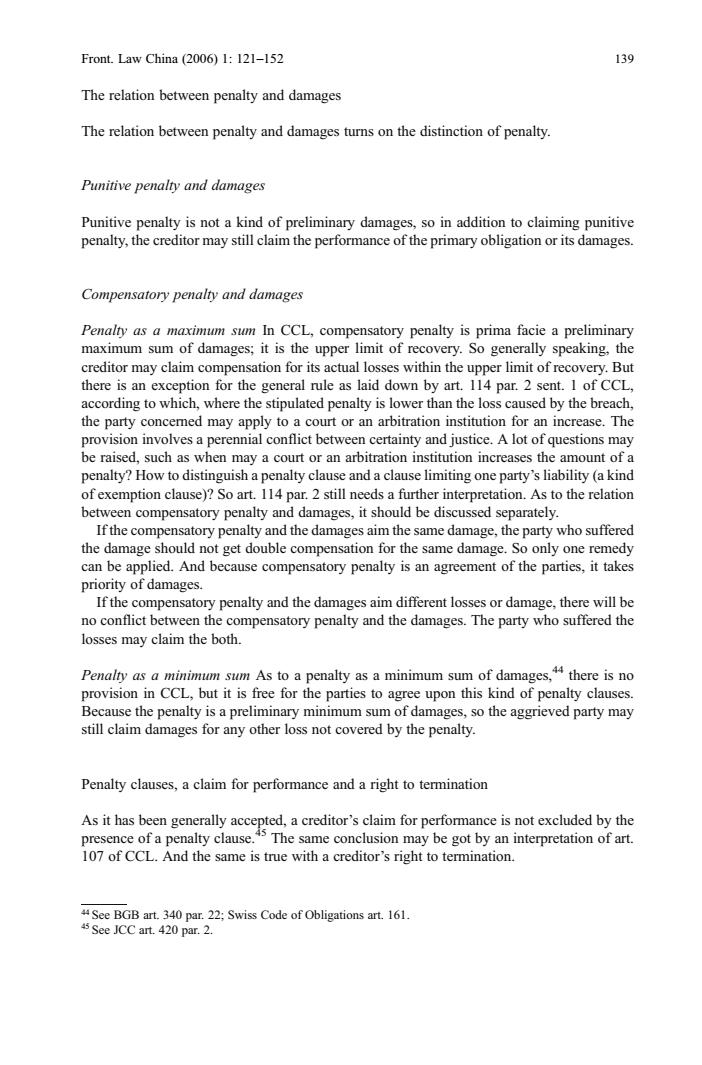正在加载图片...

Front.Law China(2006)1:121-152 139 The relation between penalty and damages The relation between penalty and damages turns on the distinction of penalty. Punitive penalty and damages Punitive penalty is not a kind of preliminary damages,so in addition to claiming punitive penalty,the creditor may still claim the performance of the primary obligation or its damages. Compensatory penalty and damages Penalty as a maximum sum In CCL,compensatory penalty is prima facie a preliminary maximum sum of damages;it is the upper limit of recovery.So generally speaking,the creditor may claim compensation for its actual losses within the upper limit of recovery.But there is an exception for the general rule as laid down by art.114 par.2 sent.I of CCL, according to which,where the stipulated penalty is lower than the loss caused by the breach, the party concemed may apply to a court or an arbitration institution for an increase.The provision involves a perennial conflict between certainty and justice.A lot of questions may be raised,such as when may a court or an arbitration institution increases the amount of a penalty?How to distinguish a penalty clause and a clause limiting one party's liability(a kind of exemption clause)?So art.114 par.2 still needs a further interpretation.As to the relation between compensatory penalty and damages,it should be discussed separately. If the compensatory penalty and the damages aim the same damage,the party who suffered the damage should not get double compensation for the same damage.So only one remedy can be applied.And because compensatory penalty is an agreement of the parties,it takes priority of damages. If the compensatory penalty and the damages aim different losses or damage,there will be no conflict between the compensatory penalty and the damages.The party who suffered the losses may claim the both. Penalty as a minimum sum As to a penalty as a minimum sum of damages,there is no provision in CCL,but it is free for the parties to agree upon this kind of penalty clauses. Because the penalty is a preliminary minimum sum of damages,so the aggrieved party may still claim damages for any other loss not covered by the penalty. Penalty clauses,a claim for performance and a right to termination As it has been generally accepted,a creditor's claim for performance is not excluded by the presence of a penalty clause.The same conclusion may be got by an interpretation of art. 107 of CCL.And the same is true with a creditor's right to termination. 4 See BGB art.340 par.22;Swiss Code of Obligations art.161. 45 See JCC art.420 par.2.The relation between penalty and damages The relation between penalty and damages turns on the distinction of penalty. Punitive penalty and damages Punitive penalty is not a kind of preliminary damages, so in addition to claiming punitive penalty, the creditor may still claim the performance of the primary obligation or its damages. Compensatory penalty and damages Penalty as a maximum sum In CCL, compensatory penalty is prima facie a preliminary maximum sum of damages; it is the upper limit of recovery. So generally speaking, the creditor may claim compensation for its actual losses within the upper limit of recovery. But there is an exception for the general rule as laid down by art. 114 par. 2 sent. 1 of CCL, according to which, where the stipulated penalty is lower than the loss caused by the breach, the party concerned may apply to a court or an arbitration institution for an increase. The provision involves a perennial conflict between certainty and justice. A lot of questions may be raised, such as when may a court or an arbitration institution increases the amount of a penalty? How to distinguish a penalty clause and a clause limiting one party’s liability (a kind of exemption clause)? So art. 114 par. 2 still needs a further interpretation. As to the relation between compensatory penalty and damages, it should be discussed separately. If the compensatory penalty and the damages aim the same damage, the party who suffered the damage should not get double compensation for the same damage. So only one remedy can be applied. And because compensatory penalty is an agreement of the parties, it takes priority of damages. If the compensatory penalty and the damages aim different losses or damage, there will be no conflict between the compensatory penalty and the damages. The party who suffered the losses may claim the both. Penalty as a minimum sum As to a penalty as a minimum sum of damages,44 there is no provision in CCL, but it is free for the parties to agree upon this kind of penalty clauses. Because the penalty is a preliminary minimum sum of damages, so the aggrieved party may still claim damages for any other loss not covered by the penalty. Penalty clauses, a claim for performance and a right to termination As it has been generally accepted, a creditor’s claim for performance is not excluded by the presence of a penalty clause.45 The same conclusion may be got by an interpretation of art. 107 of CCL. And the same is true with a creditor’s right to termination. 44 See BGB art. 340 par. 22; Swiss Code of Obligations art. 161. 45 See JCC art. 420 par. 2. Front. Law China (2006) 1: 121–152 139